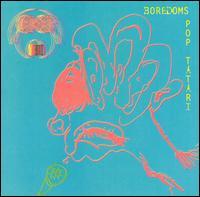The Japanese noise scene has seen a plethora of artists come and go, all with their own quirks and wild tendencies, but none are quite like the Boredoms. Not only have the Boredoms been doing this for a long time, but they've undergone a considerable change throughout that period, a change that is quite drastic compared to plenty of other noise artists who oftentimes narrowly define their sound and pigeonhole themselves. One thing has always followed them however, and that's fun. Noise music isn't generally fun, but somehow these rockers manage to keep an undercurrent of humor throughout their insanity -- not so much directly, of course, but there are moments where their sense of humor shines through so clearly without sacrificing anything in the music that you can't help but smile.
All is not fun and games in Pop Tatari, though. This is classic, old-school Boredoms right here; none of the lighter, jam sessions of later output such as Vision Creation Newsun (but honestly who can argue against an album whose songs are all named with shapes), just pure, unadulterated noise insanity. Don't be fooled though, this isn't your Merzbow-style noise; instead, this relies on more traditional (well, relatively speaking anyways) methods to make their cacophony. Instead of the dominance of static and other ear-piercing noises, the Boredoms create chaos with distorted guitars, synthesizers (gone mad), random noise devices, slapping body parts, and screeching and squealing from people who sound completely possessed. To describe the sound of Pop Tatari is a nearly fruitless endeavor, as the album goes through so many progressions and uses so many different elements and arrangements one can never be assured of what is to come.
Speaking of this unpredictability, remember when rock music was dangerous? Yeah, me neither. I think it was some time long ago, but perhaps all the names you hear about were somewhat romanticized. Either way, the true legacy of rock, with all its dangerous and wild abandon lies in bands like the Boredoms and albums like Tatari. Sure, there is music people often call psychedelic, but come on, this is psychedelic; but not your everyday "I wish I was on drugs" psychedelia, no, this is the real deal "oh shit, what the hell is going on" brand. The vocalist, Yamantaka Eye, goes by eYe. Come on, with a nickname like that, you know this guy has to be serious -- about being insane anyways.
This album still stands today as an amazing noise record, breaking further boundaries with the use of so many different elements and combining them in so many different ways, it still sounds fresh 12 years later. The album begins with "Noise Ramones," which is nothing more than an ear-piercing tone with two continually higher tones added after a short time. This breaks off into the equally bizarre "Nice B-O-R-E Guy & Boyoyo Touch," which has a jam vibe to it, remaining in check for some time. These two songs are merely a minute and a half together, yet they introduce the bipolar nature of the record perfectly. Afterwards, they take no prisoners as the unchecked screaming insanity reigns in over the shuddering guitar and seemingly random background percussion. Then after these three short sprints, they immediately shift into the seven minute-plus "Bo Go." The song goes everywhere. Conventional structure is thrown out the window even as a wild and raw funk beat rises amongst the noise of "Bo Go" and drives the song in multiple places, giving it a sort of catchiness that is undeniable even while surrounded by such different elements.
Switching things up further, the beginning of "Okinawa Rasta Beef (Mockin' Fuzz 2)" begins with only vocals, which come in some of the weirdest forms imaginable. Then the accompanying percussion only gives the possessed a beat before erupting into a cacophony of guitars and trumpets. The sudden stop in the music gives way to reverberating speaking, with incomprehensible vocals alongside it. The swirling vocals and guitars seem to come from everywhere on "Which Dooyoo Like?" before an odd reggae-inspired section fades off. "Cheeba" is a monster of a song at over nine minutes, continually evolving between pieces of relative silence and utter explosions of noise. The title track is perfect. At only a minute and a half, it embodies all the uniqueness, all the variety and all the playfulness that the record conveys. The ten minute-plus closer "Cory & the Mandara Suicide Pyramid Action or Gas Satori" ends the album perfectly, with an ever evolving song, continually building into an acute spastic roar toward the end.
When it comes down to it though, describing this album can never do it justice. It's survived over 12 years without losing any of its luster, immediacy or uniqueness. It still stands as one of the best, if not the highlight, of the Boredoms' music career, which says quite a lot. The personality, which overflows from this record, sets it apart from so many other noise records. The humor and unconventional ways of expressing it make the record incredibly listenable (although most likely not to a normal audience), which explains the fairly large crowd of followers Pop gained for the Boredoms. There's little doubt that this may be one of the most strange, compelling releases from a major label in a very long time (how this was even on a major is pretty amazing), and although the Boredoms never quite garnered the same success or notoriety in the U.S. that they did in Japan, they continued on undaunted. Yamamoto said "Sound is everywhere. It is anything. And whatever we think is interesting, sound, we begin to collage it together⦠But don't take so seriously what we're doing," and it couldn't fit any better. The Boredoms take rock music and transform and mold it into something that is at times shocking and weird, unique and dangerous, but always beautiful.
